The United States Executive Education Program Market is estimated to be valued at USD 9.1 billion in 2025 and is projected to reach USD 18.0 billion by 2035, registering a compound annual growth rate (CAGR) of 7.1% over the forecast period.
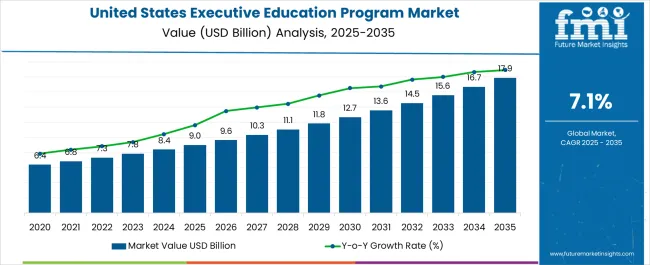
| Metric | Value |
|---|---|
| United States Executive Education Program Market Estimated Value in (2025 E) | USD 9.1 billion |
| United States Executive Education Program Market Forecast Value in (2035 F) | USD 18.0 billion |
| Forecast CAGR (2025 to 2035) | 7.1% |
The United States executive education program market is expanding as business leaders and professionals seek continuous skill development to adapt to rapidly evolving corporate landscapes. Growing emphasis on leadership resilience, digital transformation, and organizational agility has elevated demand for specialized executive learning.
Institutions are increasingly tailoring programs to align with industry-specific needs and integrating experiential learning models that enhance practical application. The rise of hybrid and flexible formats has expanded accessibility, enabling busy executives to balance professional commitments with advanced education.
Strong collaborations between universities and corporations are further shaping curriculum relevance. The market outlook remains positive as enterprises prioritize leadership pipeline development and lifelong learning initiatives, reinforcing the role of executive education in maintaining competitive advantage.
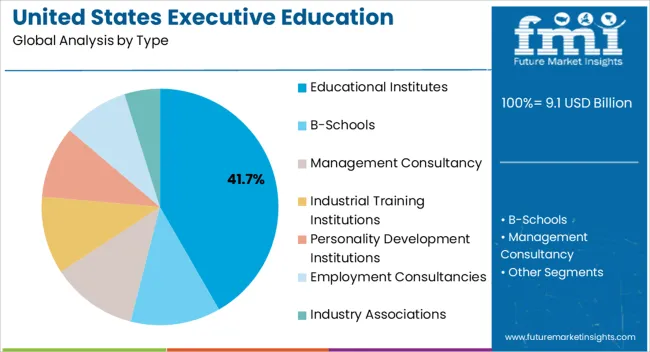
The educational institutes segment is expected to account for 41.70% of total market revenue by 2025 within the type category, establishing it as the most prominent segment. This growth is being supported by the credibility and resources of universities and business schools, which attract professionals seeking globally recognized certifications and thought leadership.
Extensive faculty expertise, research-driven curriculum design, and networking opportunities have strengthened the preference for programs conducted by educational institutes. Partnerships with multinational corporations and executive forums have further enhanced the reach and impact of such institutions.
As executives prioritize trusted, academically rigorous training, educational institutes continue to dominate the type category.
The personal counseling social and behavioural leadership course category is projected to contribute 36.50% of market revenue by 2025, making it a leading segment in course offerings. Its growth is being driven by the recognition that leadership effectiveness is closely tied to emotional intelligence, behavioral adaptability, and interpersonal communication.
Executives are increasingly pursuing programs that strengthen self-awareness, conflict resolution, and decision-making capabilities to lead diverse teams effectively. The rising complexity of corporate environments and the need for socially responsible leadership have reinforced demand for this course category.
By providing tools for personal growth alongside organizational leadership, this segment continues to resonate strongly with executives aiming to build holistic management competencies.
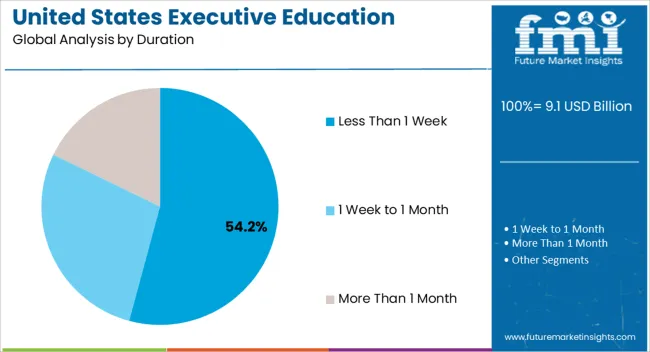
The less than 1 week duration segment is projected to hold 54.20% of total revenue by 2025, making it the dominant format under duration. Its popularity is being driven by the demand for concise, high-impact learning experiences that minimize time away from professional responsibilities.
These short-duration programs offer targeted content delivery, often focusing on specific skills or emerging trends, which aligns with the fast-paced schedules of senior executives. The integration of workshops, simulations, and case studies in a condensed timeframe enhances learning effectiveness while ensuring quick applicability in workplace settings.
As organizations encourage executive participation in continuous development without disrupting business operations, the less than 1 week format has become the preferred choice, ensuring it leads the duration segment.
Executive education programs in the United States have a rich history dating back several decades. These programs have traditionally been offered by top-ranked business schools and universities. They aim to provide business executives & professionals with advanced knowledge and skills to enhance their leadership abilities and drive organizational success.
In the past, executive education programs typically focused on core business topics such as finance, marketing, and strategy. However, over time, these programs have evolved to include a broader range of topics such as leadership development, innovation, entrepreneurship, and digital transformation.
Executive education programs are targeted toward professionals who want to advance their career by acquiring new skills, knowledge, and networks. Several executive education programs are nowadays offered online, which has made them more accessible to a wide audience. This has also made it easier for professionals to balance their work and personal commitments while pursuing further education.
These factors are set to push innovation and alter current patterns in the field of executive education programs throughout the assessment period. The market is predicted to flourish at a CAGR of 7.1% between 2025 and 2035, says Future Market Insights (FMI).
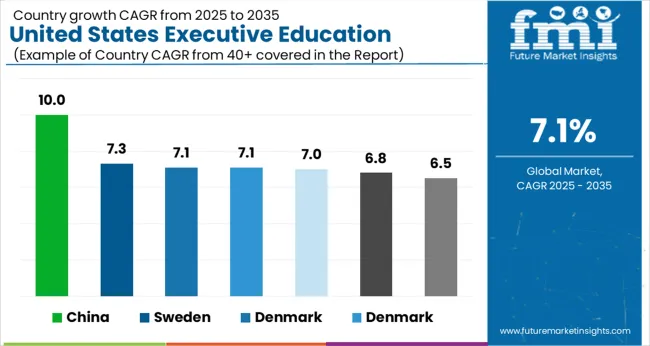
| Region | West Region |
|---|---|
| Market Share (2025) | 25.9% |
| Market Share (2035) | 20.2% |
| BPS Analysis | (-) 575 |
| Region | Southwest Region |
|---|---|
| Market Share (2025) | 17.0% |
| Market Share (2035) | 16.5% |
| BPS Analysis | (-) 52 |
| Region | Midwest Region |
|---|---|
| Market Share (2025) | 16.1% |
| Market Share (2035) | 17.5% |
| BPS Analysis | (+)142 |
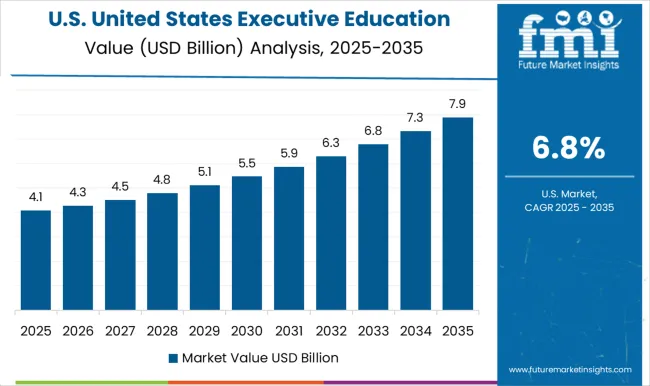
Presence of Top Ranked Universities and Business Schools in the West to Push Need for Executive MBA Programs
West region of the United States is home to various top-ranked universities and business schools, including Stanford, UC Berkeley, University of California, and University of Southern California among others. These institutions offer a wide range of programs such as certificate programs, short courses, and custom executive education programs for organizations.
On the back of such factors, the West region is predicted to be one of the most lucrative markets in the country. It is expected to account for over 25.9% of market share in the United States through 2025.
Business Schools in Southwest to Offer Real-world Experiences through Executive Development Courses
In 2025, the West United States is likely to account for over 17.0% of market share. Universities and business schools present in the Southwest region of the United States are projected to maintain their dominance by partnering with businesses & organizations in the region.
By forming strong partnerships, business schools can provide students with valuable opportunities to gain real-world experience. They would also help students to network with professionals in their field and learn from industry leaders.
These partnerships might also benefit businesses and organizations as they would be able to gain access to talented and motivated students. They can help solve business challenges and contribute to their growth.
Presence of Well-established Industries in Midwest to Fuel Need for Executive Leadership Courses
The Midwest region is expected to account for over 16.1% of the United States executive education program industry share through 2025. It is owing to easy access to the latest technologies along with high penetration of industries in the region.
The Midwest region is home to numerous industries such as agriculture, manufacturing, healthcare, and technology. These industries require a skilled workforce with advanced business knowledge. High presence of these industries is set to create a favorable environment for growth in the region.
Demand for Executive Development Programs to Surge across Educational Institutes
The United States market is dominated by educational institutes in terms of type. The segment is projected to hold the lion’s share of 32.9% in 2025.
Educational institutes have the resources and expertise to provide high-quality programs that meet the needs of business leaders. They have established relationships with companies and industry experts. This would allow them to create unique programs that are relevant and applicable to the real world.
Educational institutes present in the country also have a reputation for excellence and a long history of providing educational services. It might attract top talent and further help to build credibility with potential clients.
Need for Executive Management Programs to Expand to Brush up One’s Leadership Skills
Based on course category, the personal counseling/social & behavioral/leadership segment is likely to remain at the forefront. They are mainly preferred by users as these courses are designed to help professionals develop the skills and knowledge necessary to succeed in leadership positions.
These also help to manage interpersonal relationships effectively. The personal counseling/social & behavioral/leadership segment is anticipated to expand at a rapid pace, with a CAGR of more than 5.5% during the projected period.
Several organizations have recognized the importance of investing in their employees' personal and professional development. It has led to an increasing demand for executive education programs.
Users are Looking for Executive Education Online to Save on Accommodation and Travel Costs
Virtual learning has become increasingly popular in recent years and has accelerated due to the pandemic. The mode of delivery through virtual learning has had a significant impact on the United States executive education program industry.
Virtual learning provides flexibility, convenience, and accessibility to executive education programs. It allows professionals to learn at their own pace, from anywhere, and at any time.
This mode of delivery eliminates the need for travel, accommodation, or other associated costs, making it more cost-effective for participants and organizations. Virtual learning in terms of mode of delivery is anticipated to contribute a share of more than 61.0% in 2025.
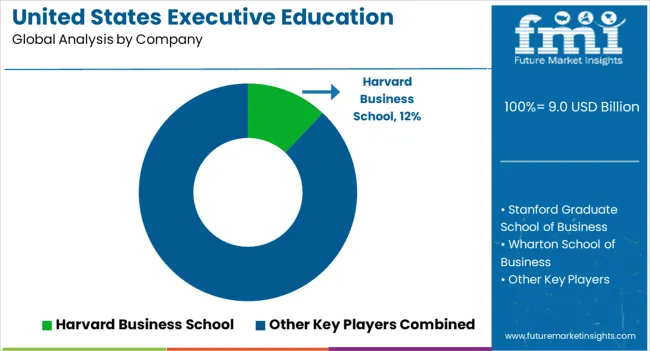
Service providers such as business schools and universities in the United States executive education program industry are seeking strategic alliances and partnerships with other universities. They aim to diversify their services or courses offerings and meet the need of a growing customer base.
For instance
| Attribute | Details |
|---|---|
| Estimated Market Size (2025) | USD 9.1 billion |
| Projected Market Valuation (2035) | USD 18.0 billion |
| Value-based CAGR (2025 to 2035) | 7.1% |
| Forecast Period | 2025 to 2035 |
| Historical Data Available for | 2020 to 2025 |
| Market Analysis | Value (USD million) |
| Key Regions Covered | West Region; Southwest Region; Midwest Region; North East Region; South East Region |
| Key Countries Covered | United States |
| Key Segments Covered | Type, Course Category, Duration, Mode of Delivery, Region |
| Key Companies Profiled | Harvard Business School; Columbia University; MIT Sloan School of Management; Stanford Graduate School of Business; Baruch College; Wharton School of Business; UCLA Anderson School of Business; Kellogg School of Management; Stephen M. Ross School of Management; The University of Chicago Booth School of Business; The University of Texas at Austin; Cornell SC Johnson; Rotman School of Management; Ted Rogers; UBC Sauder School of Business; Durham University - Business School |
| Report Coverage | Market Forecast, Company Share Analysis, Competition Intelligence, Market Dynamics and Challenges, and Strategic Growth Initiatives |
The global united states executive education program market is estimated to be valued at USD 9.1 billion in 2025.
The market size for the united states executive education program market is projected to reach USD 18.0 billion by 2035.
The united states executive education program market is expected to grow at a 7.1% CAGR between 2025 and 2035.
The key product types in united states executive education program market are educational institutes, b-schools, management consultancy, industrial training institutions, personality development institutions, employment consultancies and industry associations.
In terms of course category, personal counseling/social & behavioural/leadership segment to command 36.5% share in the united states executive education program market in 2025.






Our Research Products

The "Full Research Suite" delivers actionable market intel, deep dives on markets or technologies, so clients act faster, cut risk, and unlock growth.

The Leaderboard benchmarks and ranks top vendors, classifying them as Established Leaders, Leading Challengers, or Disruptors & Challengers.

Locates where complements amplify value and substitutes erode it, forecasting net impact by horizon

We deliver granular, decision-grade intel: market sizing, 5-year forecasts, pricing, adoption, usage, revenue, and operational KPIs—plus competitor tracking, regulation, and value chains—across 60 countries broadly.

Spot the shifts before they hit your P&L. We track inflection points, adoption curves, pricing moves, and ecosystem plays to show where demand is heading, why it is changing, and what to do next across high-growth markets and disruptive tech

Real-time reads of user behavior. We track shifting priorities, perceptions of today’s and next-gen services, and provider experience, then pace how fast tech moves from trial to adoption, blending buyer, consumer, and channel inputs with social signals (#WhySwitch, #UX).

Partner with our analyst team to build a custom report designed around your business priorities. From analysing market trends to assessing competitors or crafting bespoke datasets, we tailor insights to your needs.
Supplier Intelligence
Discovery & Profiling
Capacity & Footprint
Performance & Risk
Compliance & Governance
Commercial Readiness
Who Supplies Whom
Scorecards & Shortlists
Playbooks & Docs
Category Intelligence
Definition & Scope
Demand & Use Cases
Cost Drivers
Market Structure
Supply Chain Map
Trade & Policy
Operating Norms
Deliverables
Buyer Intelligence
Account Basics
Spend & Scope
Procurement Model
Vendor Requirements
Terms & Policies
Entry Strategy
Pain Points & Triggers
Outputs
Pricing Analysis
Benchmarks
Trends
Should-Cost
Indexation
Landed Cost
Commercial Terms
Deliverables
Brand Analysis
Positioning & Value Prop
Share & Presence
Customer Evidence
Go-to-Market
Digital & Reputation
Compliance & Trust
KPIs & Gaps
Outputs
Full Research Suite comprises of:
Market outlook & trends analysis
Interviews & case studies
Strategic recommendations
Vendor profiles & capabilities analysis
5-year forecasts
8 regions and 60+ country-level data splits
Market segment data splits
12 months of continuous data updates
DELIVERED AS:
PDF EXCEL ONLINE
Executive Education Program Market Size and Share Forecast Outlook 2025 to 2035
Industry Share & Competitive Positioning in Executive Education Program
United States and Canada Educational Tourism Market Growth, Trends and Forecast from 2025 to 2035
Key Companies & Market Share in United States Executive Education Program Sector
United States Leadership Development Program Market Size and Share Forecast Outlook 2025 to 2035
Canada Executive Education Program Market Size and Share Forecast Outlook 2025 to 2035
Online Executive Education Program Market Trends – Growth & Forecast 2024-2034
Nordics Executive Education Program Market Size and Share Forecast Outlook 2025 to 2035
United States Hand Holes Market Size and Share Forecast Outlook 2025 to 2035
United States Walk-in Cooler and Freezer Market Size and Share Forecast Outlook 2025 to 2035
United States Commercial Refrigeration Equipment Market Forecast and Outlook 2025 to 2035
United States Dog Toys Market Size and Share Forecast Outlook 2025 to 2035
United States Biodegradable Cups and Lids Market Size and Share Forecast Outlook 2025 to 2035
United States Green Tea Supplement Market Size and Share Forecast Outlook 2025 to 2035
United States Hispanic Novelties Market Size and Share Forecast Outlook 2025 to 2035
United States Scented Garbage Bags Market Size and Share Forecast Outlook 2025 to 2035
United States and Canada Tray Sealing Machines Market Size and Share Forecast Outlook 2025 to 2035
United States Label Release Liner Market Size and Share Forecast Outlook 2025 to 2035
United States Beetroot Supplement Market Size and Share Forecast Outlook 2025 to 2035
United States Garbage Bags Market Size and Share Forecast Outlook 2025 to 2035

Thank you!
You will receive an email from our Business Development Manager. Please be sure to check your SPAM/JUNK folder too.
Chat With
MaRIA